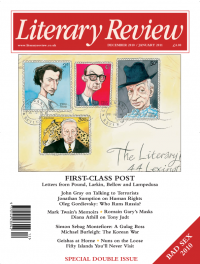Patricia Duncker
Romain A Clef
Romain Gary: A Tall Story
By David Bellos
Harvill Secker 497pp £30
The root of the word ‘pseudonym’ is ‘pseudos’, which means a lie. Romain Gary (1914–80) acted out his life and published his writing via a welter of pseudonyms. He called himself Shatan Bogat, René Deville, Fosco Sinibaldi (after Count Fosco in The Woman in White, a novel he adored), John Markham Beach and, most famously, Emile Ajar. Why use a pseudonym? Always, or almost always, it means you have something to hide. Many eighteenth-century novels were published anonymously, but to publish as Anon, as Jane Austen did in her lifetime, is not the same thing as adopting another identity or gender different from your own. George Eliot could be a respectable clergyman whereas Marian Evans was a public scandal, and the careful sexual ambiguity of some contemporary writers – J K Rowling, A L Kennedy, A S Byatt – suggests that being read as a woman is still perceived as a disadvantage.
Gary’s problem was literary success. Writing as Romain Gary he became a bestselling author in France and the Anglo-Saxon countries, translating his own work and writing both in French and in English, during the Forties, Fifties and Sixties. He won the Prix des Critiques in 1945 for his

Sign Up to our newsletter
Receive free articles, highlights from the archive, news, details of prizes, and much more.@Lit_Review
Follow Literary Review on Twitter
Twitter Feed
It wasn’t until 1825 that Pepys’s diary became available for the first time. How it was eventually decrypted and published is a story of subterfuge and duplicity.
Kate Loveman tells the tale.
Kate Loveman - Publishing Pepys
Kate Loveman: Publishing Pepys
literaryreview.co.uk
Arthur Christopher Benson was a pillar of the Edwardian establishment. He was supremely well connected. As his newly published diaries reveal, he was also riotously indiscreet.
Piers Brendon compares Benson’s journals to others from the 20th century.
Piers Brendon - Land of Dopes & Tories
Piers Brendon: Land of Dopes & Tories - The Benson Diaries: Selections from the Diary of Arthur Christopher Benson by Eamon Duffy & Ronald Hyam (edd)
literaryreview.co.uk
Of the siblings Gwen and Augustus John, it is Augustus who has commanded most attention from collectors and connoisseurs.
Was he really the finer artist, asks Tanya Harrod, or is it time Gwen emerged from her brother’s shadow?
Tanya Harrod - Cut from the Same Canvas
Tanya Harrod: Cut from the Same Canvas - Artists, Siblings, Visionaries: The Lives and Loves of Gwen and Augustus John by Judith Mackrell
literaryreview.co.uk